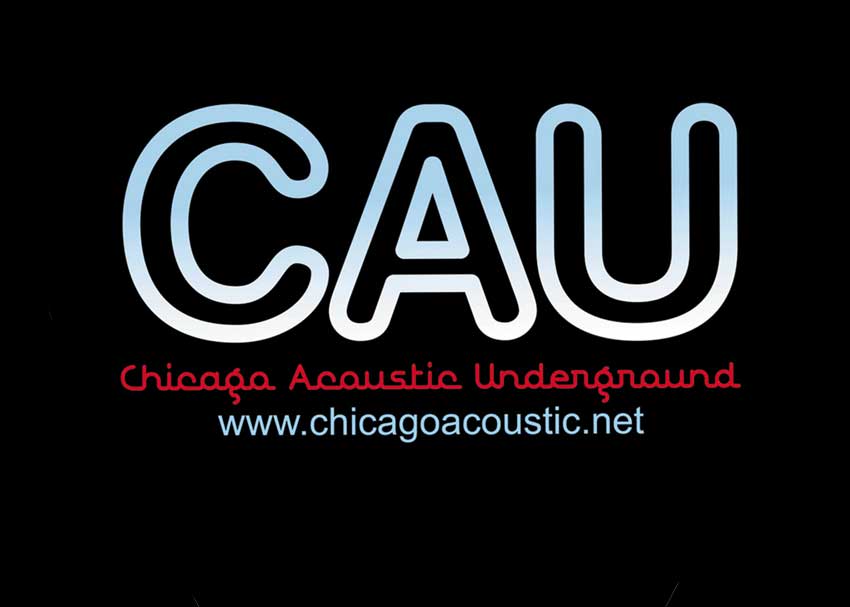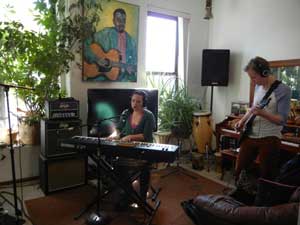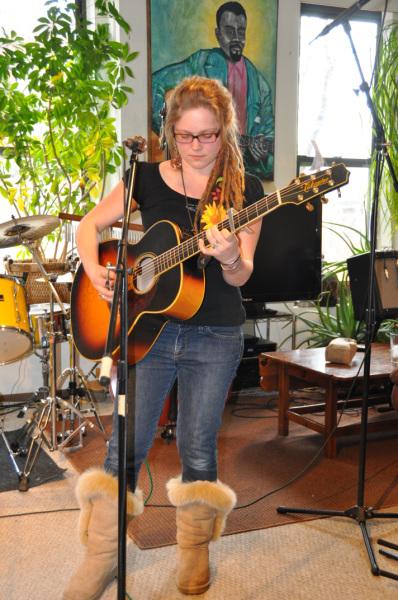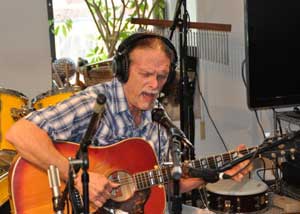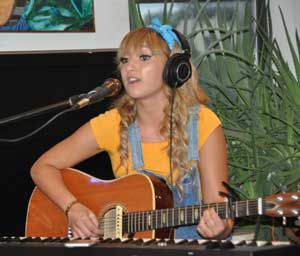Michael Teach listens intently as singer-songwriter Sarah Eide and her band knock out a set of original tunes in the living room of his Chicago apartment. “I love that!” he proclaims into his Neumann TLM-103 microphone as the group wraps up their first number. “What a cool song!”
Your average 70-year-old doesn’t get quite this excited about new music and the under-the-radar artists that create it. But Michael Teach isn’t your average 70-year-old. As the host of the Chicago Acoustic Underground podcast, Teach is constantly going to shows, meeting new artists, bringing them to his cozy living room studio, recording their performances, and then podcasting the results to an ever-growing international audience — with well over 600 episodes and counting.
“We draw a lot of really amazing talent,” gushes Teach with his trademark enthusiasm. “Sarah Eide — whoa! Oh my God. She came in here with her band, and I was in my no-alcohol mode, so I was dead sober. I just kept going, ‘Stop it, Sarah, you’re making me cry.’ Her voice, and her keyboard technique, and her songwriting — those were all her songs. This city has so many talented people.”
“Why Don’t We Turn This Into a Podcast?”
The first episode of the Chicago Acoustic Underground podcast went up for download in August 2006 — an eternity ago, in Internet time. “Before there was Facebook, the podcast was a way for artists to get their music online,” says CAU publicist Hannah Frank, herself a singer-songwriter and an indispensable part of the CAU team since 2009.
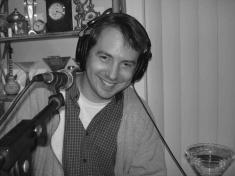
CAU co-founder Jacob Covington
“I was only going to do the podcast for a year or two,” Teach claims. “We used to play music here, spontaneously, damn near every night,” he says, gesturing around an apartment loaded with vintage instruments, custom-modded amps and recording gear. “The guy who was the inspiration for it to be a podcast — his name was Jacob Covington, a brilliant sax player from Chicago…we were sitting here one night, and Jacob says, ‘Why don’t we turn this into a podcast?’ And I looked at him and said, ‘Uh, what? What’s a podcast?’ So he played me a couple of them that were out there. I said, ‘Wow, what does it take to do that?’ ‘Well, you need a mixer, and some software…’ I said, ‘That doesn’t sound too difficult. I already know more or less how to mix.'”
Covington and Teach needed a name for their fledgling podcast. “We said, ‘What kind of hooks can we put in this name that will draw people to it?’ Chicago, the third-biggest city — we gotta use that. Then, we were really one of the cities that created the underground FM radio thing, so why don’t we use ‘Underground’? Then, we’re kind of known for the John Prines and the Steve Goodmans…so ‘Acoustic.’ So, Chicago Acoustic Underground.” But Teach doesn’t let the name put limits on the music he features on the show. “A lot of bands would say, ‘We don’t do any acoustic stuff.’ I don’t care. It’s just a name.” (Check out the prog-influenced pop-rock of Molehill in Episode 293, or the frenetic plugged-in punk of Earth Program in Episode 512.)
In addition to hosting 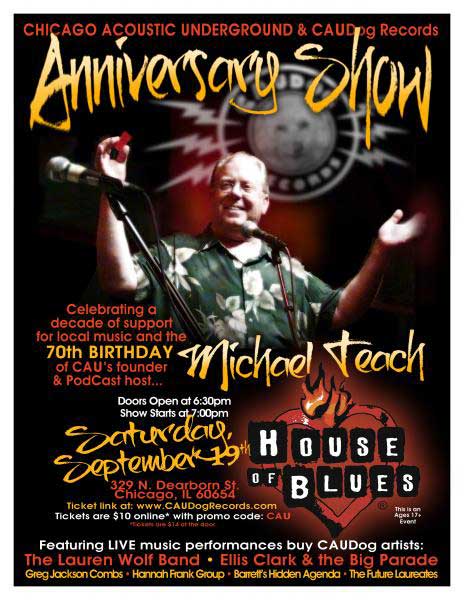 and producing the CAU podcast, Teach founded CAUDog Records — “Chicago’s most artist-friendly label” — with 14 releases out so far, and more on the way. And with the able assistance of the CAU staff — publicist Frank, engineers Michael Narvaez and Barrett Tasky, CAUDog producer Ellis Clark, legal counsel Jeff Brown, videographer Alex Thorn, merchandise manager Debbie Mac, and more — Teach has organized numerous live performances at Chicago’s Mayne Stage and many more venues.
and producing the CAU podcast, Teach founded CAUDog Records — “Chicago’s most artist-friendly label” — with 14 releases out so far, and more on the way. And with the able assistance of the CAU staff — publicist Frank, engineers Michael Narvaez and Barrett Tasky, CAUDog producer Ellis Clark, legal counsel Jeff Brown, videographer Alex Thorn, merchandise manager Debbie Mac, and more — Teach has organized numerous live performances at Chicago’s Mayne Stage and many more venues.
The next stop for the CAU crew is a live show at Chicago’s House of Blues on Saturday, September 19. Nicknamed TEACHFEST 2015, this milestone event marks Teach’s 70th birthday, the 10th anniversary of the CAU podcast, and the 6th anniversary of CAUDog Records. On the bill are the Lauren Wolf Band, Ellis Clark & the Big Parade with special guests Carla Prather of Poi Dog Pondering and Mars Williams, Greg Jackson Combs, Barrett’s Hidden Agenda, the Hannah Frank Group, and the Future Laureates — and this packed roster is just a small sampling of the hundreds of artists that Teach has worked with over the years.
Famous Names — from Crystal Bowersox to Shawn Phillips
A quick peek through the CAU podcast archives yields dozens of names familiar to those acquainted with Chicago’s local music scene — and a few more famous names, like 2010 American Idol runner-up Crystal Bowersox.
Hannah Frank tells how she first met Bowersox: “I remember playing an open mic at Uncommon Ground in the late 2000s and she sang; she was really good. She told me her Myspace address, and it ended with ‘OX,’ and I thought it was like ‘hugs and kisses,’ but her last name was Bowersox. She was just another personable musician out there that was trying to connect. When she had a baby, Michael bought diapers, because he does really nice things for musicians. She needed a helping hand, and Michael helped her — and then she ended up achieving this high level of stardom. And then she came back to do a podcast.”
Teach tells his Bowersox story with the candor of a longtime friend: “She got really lucky: when American Idol was done, Clive Davis signed her. Clive, unfortunately, was trying to save a record label of his — Jive Records, which started as a hip-hop label. So he took her to New York, and took her into the studio, and I get a phone call from her at like three in the morning, going, ‘I don’t know what to do. They’re trying to make me change all my music into hip-hop.’ She was in tears. She was fighting it tooth and nail…Unfortunately, what happened then was, Sony Music Entertainment started going south, so Jive Records was just closed, and so suddenly she found herself without a label. But the management company loved her. So they kept her — and kept her busy going to county fairs and state fairs, and helped her progress. Crystal is an amazing lady, no doubt about it.”
Pressed to pick a favorite artist he’s worked with, Teach effuses about a musician closer to his own age: “A personal favorite, and for that matter, one of the best podcast experiences that we’ve had, was with a guy that nobody knows — unless you’re my age. His name is Shawn Phillips. Shawn is a brilliant songwriter. Never played in a band, always a solo artist, but played guitar on some of David Bowie’s albums — he played on lots of other people’s albums…his music is brilliant.” Teach’s bottomless enthusiasm for music is apparent when he talks about Phillips’ work. “Shawn’s amazing…he played Space in Evanston a couple years ago, and wow — he just ripped the audience apart.”
Teach re-connected with Phillips for a 2011 CAU podcast episode, after first meeting the guitarist decades earlier. “I saw a blurb that Shawn was coming back to the United States for his first live tour in, I think it was 10 years, or maybe even more. Because I had met him, it clicked into my mind…’I’m not sure he’ll remember me, but I sure remember him. I’ll give it a try.’ And so I sent an email to his manager, and said, ‘I don’t know that Shawn would ever remember this, but back in 1981, I booked him at a place called Studio in the Rockies. And he stayed at my house, and my wife cooked him meals. He was only there for 3-4 days; I’m sure he won’t remember me, but just tell him it’s the blond-haired kid from Vail, Colorado.’ I got a reply back from the manager in 30 minutes. He said, ‘Shawn absolutely remembers you, and he remembers your wife Lynn, and what a fabulous time he had when he was here, and he’ll be in Chicago on such-and-such a date, and he would love to come in and do a podcast.” I didn’t expect a response back at all, and then to get one in 30 minutes, was like, ‘Oh my God!’ If you listen to that show, which I highly recommend, a significant part of it is just listening to the man talk about life in the ’70s in England.”
Bringing In New Artists: “The Whole Mission”
For every veteran artist like Shawn Phillips, CAU hears from hundreds of unknown artists clamoring to get their music out into the world. “I’m constantly looking at artists on Facebook,” Teach says. “When I find somebody that’s pretty amazing, I’ll get in touch with them directly.”
But CAU won’t post episodes with artists that are too green. “One kid contacted me who had, like, one good song on ReverbNation, but no other songs,” says Frank. “You get people where they really want to be on the show — but can they sit down and play 4 to 5 original songs? Sometimes they can’t.”
As Teach explains, not every artist he records makes it onto the CAU podcast. “I just had to say to the artist, ‘You have a talent; it’s going to be good, but you don’t want to put this out, because it’s too soon. You’ll hurt yourself.’ I’ve had to do that quite a few times, actually, because I kept trying to bring in new, young people — that was the whole mission: to bring in people who wouldn’t have the opportunity to do something like this. And we still try to do that as much as we can.”
Teach keeps his ear to the ground for new talent. “We just brought in Frankie B, a 16-year-old, very talented young lady. My advice to her parents is to take her immediately out of school…she’s got a shot pretty much right now. Her voice is developed enough. She’s got good musicians playing with her. Now’s the time. Get her out to Nashville and get people to see her. Give it a shot right now, because 5-6 years from now, who the hell knows what the music industry is going to be?
“Any person who, at age 15 or 16, decides they want to be a musician, has probably a 100,000:1 shot of ever making it to stardom — so that’s a rather daunting percentage. This industry…it’s even more difficult than it ever was, because there’s no labels to take you on and promote you the way labels used to do — as evidenced by how many artists are self-producing and self-releasing…and I don’t blame them, because they get screwed by the contracts that labels make you sign.”
“We’re putting out music by people we really care about”
In a climate where record labels were becoming extinct, Teach decided to found a label of his own — CAUDog Records. “I saw and felt the frustration of artists — who I considered to be really good artists — getting nowhere. We had all this incredible wealth of talent that we had surrounded ourselves with…these people were so frustrated, and I wanted to help them.”
Teach explains his business plan: “If you have an already produced album, if you need a label to help you with some of the promotion and stuff, that’s what CAUDog Records is. CAUDog Records will not bring you in, have you sign a contract, and write you a check for $20,000 — that ain’t gonna happen. That’s not what CAUDog records is all about. I’ve never made a dime…we’re putting out music by people we really care about. If, by some quirk of nature, one of ’em catches — I think my highest expectations are of Carla Prather’s album. Carla is one of the vocalists with the band Poi Dog Pondering, and we’ve got her first solo album coming out next month. We have this fabulous music video that a fellow by the name of Lou Hinkhouse did. Wow — he did a great job! Poi Dog Pondering has already told her she can bring her album and sell it on tour with them. That’s like 200 shows a year. We’re looking forward to that.”
Poi Dog Pondering’s Carla Prather’s solo debut single — soon to be released on CAUDog Records:
Singing For Your Supper
In addition to their long-running podcast and the record label, Chicago Acoustic Underground hosts live performances at venues around the city.
“We had a gig at Mayne Stage for about 2 years,” says Teach. “Hannah put together this ‘Singing For Your Supper’ thing on the first Tuesday of each month. She curated and brought the talent in — some of which she found here on the podcast, and some of which she found all over the city. It became extremely popular.”
“The concept was 8-10 songwriters in an evening,” explains Frank. “Kind of like an open mic, but curated in advance, so everyone had 15-minute sets. I shamelessly stole the idea from Stage Left Cafe in Woodstock, because it just worked so well…by scheduling people in advance, you make them come…oh, I know I’m playing at 8:00; I’ll tell my friends to come there then. Because songwriters are playing for other songwriters, it’s a listening environment, but everyone can talk, chat, and meet new songwriters. I think people really liked that, as a cool, safe way to play your new material. Ultimately, we’re all making music because we want to be on stage, so it gives people a chance to do that in a low-pressure way. It really did pick up steam.”
The title “Singing For Your Supper” is accurate: performers were paid with a free dinner. As Frank explains, “They wanted to pay me a certain amount of money to run an open mic, and I was like, ‘That’s too much money. Use half of what you were going to give me for the performers to eat, and get a little food ticket, and I’ll take the other half for running sound.’ In hindsight — by the time I booked it, promoted it, and ran sound for the evening — I was probably not making much. But I wanted the performers to have a reason to come out. I would always say, ‘We’ve all played worse gigs for less.'”
CAU ended their tenure at Mayne Stage on a high note with a World Music Showcase in early 2015. “That one was a sellout at $10 bucks a ticket, thanks in no small part to Tony Sarabia at WBEZ,” says Teach as he proudly displays his membership card for the local NPR affiliate radio station. “Tony curates a world music show on WBEZ, and he immediately got in touch. We did an interview with him that they aired about two days before the show, and it easily added about 50% to the ticket sales. It was incredible.”
What’s next on the CAU live performance docket, after the big show September 19 at the House of Blues? “We’re looking for a new home, for both small shows and big shows,” says Teach. “I like the Abbey Pub — they’ve got a great sound system. Nice people to work with. We may never settle back down to one specific venue. We may use different halls for different things. I want to book something at Wire in Berwyn.”
And as for what’s next for the CAU podcast, Teach plans to keep hosting and posting episodes for a good long time — but he’s making no promises about the pace of production. “We’ll just keep it going forward. I’m not going to do nearly the amount of shows that we did in the first 10 years. 600 shows in 10 years — that’s a lot of shows.”
Hear the CAU Podcast at ChicagoAcoustic.net

